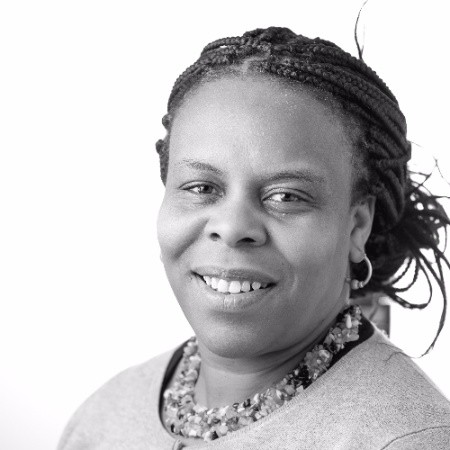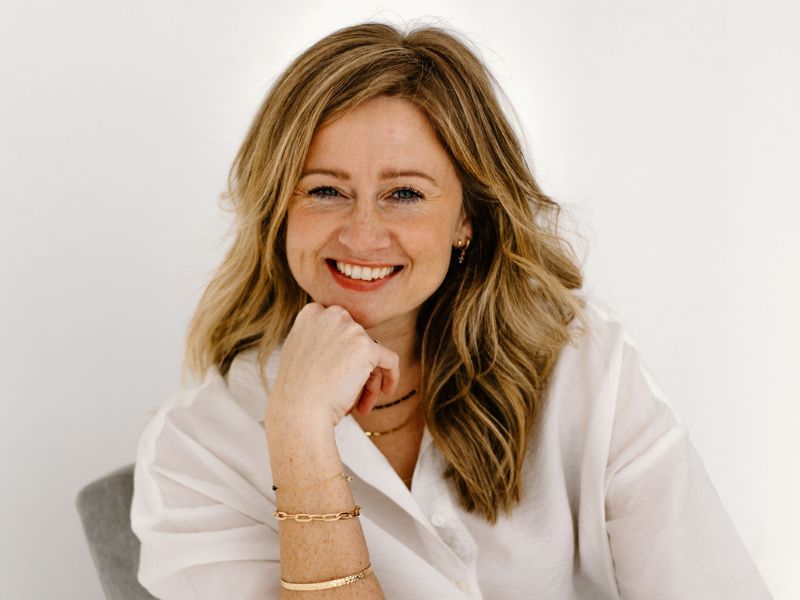Ugo Ojike, managing director at Accenture, is Accenture’s ethnicity lead.
Accenture, is Accenture’s ethnicity lead.
Having been at Accenture for over 28 years, Ugo joined as a mobilisation & market maker, before working her way up to managing director, with roles including contract management delivery lead for UKI. Prior to joining Accenture, Ugo was an accountant at KPMG, and obtained a MSc in Operational Research from The London School of Economics and Political Science (LSE).
Tell us a bit about yourself, background and your current role
I am an avid Arsenal fan, sister, wife, and mother to three young men, aged 24-13 years- yep, I can see the cavernous gap myself, so please, no judgement! I grew up in Tottenham, North London, the daughter of Nigerian parents. Perhaps one of the most unusual things about my career is that I’ve been at the same company for over 25 years! I feel have been on quite a scenic journey in my time at Accenture starting in Consulting and now working in Legal, heading up contract management for the UK & Ireland. The company is constantly changing and re-inventing which keeps the journey interesting and the environment exciting!
Along the way, I’ve picked up a couple of additional roles within Accenture as it continues to take steps to create an inclusive and equitable culture, including co-sponsoring our Afro-Caribbean network and being the ethnicity sponsor on our UK&I executive team.
Did you ever sit down and plan your career?
An interesting question, to which my first reaction was ‘No, never, I wish I had had the foresight!’ And that is absolutely correct, for the early part of my career, however, when I reflect more deeply and challenge myself, my journey probably reads more like this.
After leaving university, I first trained as a chartered accountant but quickly realised that really wasn’t what I wanted to do. Sometimes knowing what you don’t like is the first step to finding what you really love.
When I first joined Accenture (then Andersen Consulting), I was super stoked – I had joined the company, which at that time (and still is) was my dream company, and I truly believed ‘I had arrived!!!’, to coin a very West African colloquialism. I worked hard, had lots of fun, worked hard had lots of fun all over again, and then began to watch my peers overtake me. I am not quite sure I had really understood that I needed to own my own career, to own my narrative, to be my own campaign manager, and to be vocal about my aspirations. I thought my work would speak for itself, until a close friend, colleague and what we would in today’s language describe as an ‘ally,’ offered a very frank response to my question of ‘why was I not being promoted?’ He said, ‘who knows of your aspirations? Who have you talked to?’ His answer was one of my biggest ‘aha’ moments!
Without doubt, I can say it was that point that I became more vocal and intentional about charting my own course; understanding who is in the room, who the decision makers are and the importance of performance, brand, and relationship capital. Don’t get me wrong, it was far from straightforward, but a combination of understanding what I enjoy doing, having some great sponsors/mentors, coming across the right opportunities, and large dose of luck have all played a role. We can’t control when opportunities come along – but we need to be open and ready to seize them when they do arise.
Have you faced any challenges along the way?
Yes, plenty! For me, balancing children with work was a big challenge. I travelled a lot when they were young, and this was in an era when presenteeism was everything, and I found that hard. Our post-pandemic reality check has redefined the future of how we work. In addition, attitudes have changed a huge amount since my kids were young – in a good way – but we still need to do more to support people as we balance caring for dependents – whether they are young or more elderly. More companies are now introducing more robust approaches to tackling family care challenges – for example back-up care and enhanced shared parental leave – so this is worth investigating when applying for new roles.
We all face challenges. Sometimes you’re thrown in at the deep end and you find your way step-by-step. And other times you may find that you don’t have confidence in your ability but everyone else does, and you need to find ways to reconcile that. Imposter syndrome is real, and it has taken me time reconcile that the discomfort this brings, is a place of learning and that, for me, learning is goodness.
Today, I feel my difference is my superpower, but I haven’t always felt that way. Sometimes being the ‘only one in the room’ or ‘being the first’, comes with a sense of pressure i.e., if I fail or make mistakes, does that close off opportunities for others like me? So, I have at times put all this additional pressure on myself, when in reality, we should be learning and growing from our failures, everyone should be entitled to that. I moved forward by understanding and appreciating my own difference, and self-worth, as well as making sure I am the author of my own narrative in any space I’m in, and not leaving that to others who may want to shape that for you – but it took time and work to get to that point. I’m proud that we are on a journey to build a more inclusive workplace where people feel safe to be their authentic selves and thrive whilst doing so.
What has been your biggest achievement to date?
From a career perspective, I am so proud that I enjoy what I do. If I wasn’t excited by it, I would have gone somewhere else a long time ago.
I get out of bed in the mornings because I’m passionate about my day job of commercially supporting our business and clients – but I also get to play a role, along with a very talent group of people, to drive progress in inclusion, diversity, and equity, helping to embed this mindset into how we operate as an organisation. This sense of stewardship motivates me to help to make the workplace and the world a better place for those that come after us!
What one thing do you believe has been a major factor in you achieving success?
I’m not sure there is one thing, but rather a combination of factors. I’ve been incredibly lucky to have had leaders and managers that have believed in me – and tested, challenged and stretched me. Equally, I have also worked with people who have helped hold up a mirror of what I don’t want to be.
In terms of something I’ve had control over, I think one of my strengths is being able to pick myself up when things don’t go right. Some days are just bad days, and it is unapologetically ok to have bad days! But at some point, you need to find a way to turn those stumbling blocks into steppingstones, – and a lot of the time that means talking things through with someone.
I really do rely on the input of the people around me – whether that’s inside or outside the workplace. I like to think of it as my own ‘board of directors’ where I test and talk out decisions with people who will challenge me and help me see different perspectives.
Finally, there is a recognition that what got me where I am in my career today, may not get me to where I want to be tomorrow, so it is important that I continue to re-assess me and change it up!
How do you feel about mentoring? Have you mentored anyone or are you someone’s mentee?
We really encourage mentoring at Accenture and were recently named No.3 for top companies for mentoring in DiversityInc’s rankings. There is so much value in mentorship and being able to share experiences, that can ultimately help to guide someone along their path, helping them to find the keys to, what may look like, locked doors.
One of the approaches we take is 360 mentoring. It is so important to have someone more junior than yourself to give some really honest feedback and help you understand what’s happening on the ground. It’s especially important for people who have climbed the ranks to pause and get that reality check.
If you could change one thing to accelerate the pace of change for Gender Equality, what would it be?
Some gender equality issues are systemic – and more companies need to create systems and structures to show that they care in the moments that matter to the workforce.
I’d also like to see much faster progress in having more women at more senior levels. To get there we need lead boldly by shaping and developing goals, and then hold ourselves accountable. At Accenture we have set bold goals to accelerate gender equality – and, today, 50% of our board of directors and 27% of our global management committee are women. However, goals alone are not enough; there is a human experience, a person at the centre of all of this, so we also need to ensure we are taking comprehensive action to attract and retain women, and in parallel we create inclusive cultures and empowering environments.
If you could give one piece of advice to your younger self what would it be?
Be intentional about going out and grabbing opportunities, and don’t feel like you need to hold yourself back because you don’t meet 100% of the required criteria. Everyone has doubt but you need to keep moving forward. No one should ever turn down an opportunity because they’re afraid of making mistakes because this is how we all learn and grow.
What is your next challenge and what are you hoping to achieve in the future?
Earlier I said, the sense of stewardship I get from driving progress in inclusion, diversity, and equity motivates me to help to make the workplace and the world a better place for those that come after us! I am far from done – this challenge will keep me busy for quite some time!








